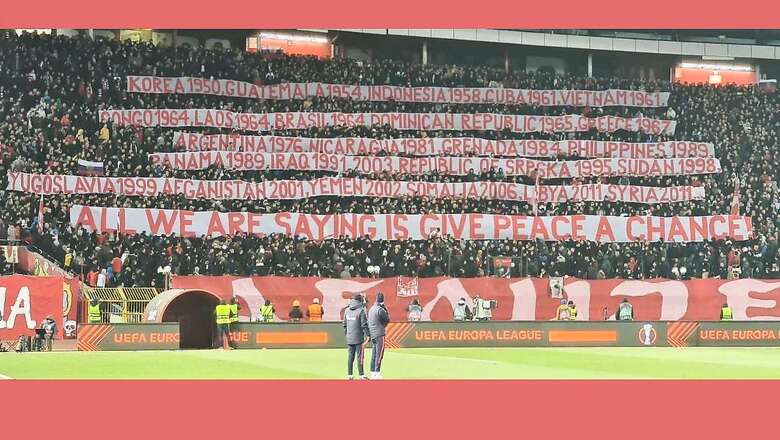
views
Serbian football club Red Star Belgrade’s fans, also known as the Delije, last Thursday through a display of banners showed the nations which the US invaded along with the year of those invasions. The Delije also held a banner requesting to ‘give peace a chance’.
The gesture has become viral and also in a manner held a mirror to the US and its allies who are lecturing Russia on war crimes and military interventions over its war on Ukraine. Even Chinese diplomat Hua Chunying also tweeted the video of the fans with the banner.
https://twitter.com/SpokespersonCHN/status/1505183619253682177?s=20&t=mjo9xLz8VqBWYqr98NvsqQ
The banners mentioned US’ so-called military interventions starting from ‘Korea 1950’ to ‘Syria 2011’. The final banner read ‘All we are saying is give peace a chance.’
Red Star Belgrade itself has also taken a clear stand with respect to sanctions imposed on Russian clubs from football bodies like the Union of European Football Associations (UEFA) and Fédération Internationale de Football Association (FIFA) (both of which have been accused of being mired in corruption itself).
“We went through this in 1992. There is anti-Russian hysteria in Europe, politics is unnecessarily interfering in sports,” club’s general director, Zvezdan Terzic was quoted as saying by Russian news agency RT. Terzic also said that he will not discontinue their sponsorship deal with Russian energy giant Gazprom.
Terzic said Russian people are close to the Serbs. “We sympathise with the Ukrainian people and the terrible civilian casualties, but the Russian people are close to the Serbs and always will be. Russia is a power that has always been on the Serbian side,” Terzic further added.
https://twitter.com/StoolFootball/status/1504545423373082633?s=20&t=mjo9xLz8VqBWYqr98NvsqQ
The Riot That Led To War
Russia and Serbia are close allies and Red Star Belgrade is itself embedded in the history of one of the bloodiest conflicts in Europe after World War II. European football clubs often have close ties to the history of the regions they come from and are part of the social and cultural fabric of the regions and people they represent.
Red Star Belgrade fans, or the Delije, are known for their passion towards their club. This passion also reflected during the 1990s when Serbs and Croats fought against each other as the latter sought to free itself from former Yugoslavia.
The Serb fans on May 13, 1990 were part of an infamous riot against their counterparts Bad Blue Boys, the ultra supporters of Croatian club Dinamo Zagreb, in Maksimir Stadium.
Ultras are hooligan supporters of football teams, a sight common in many football-playing nations across the world. A year later the Croat and Serb ultras were fighting each other in the frontlines.
Both clubs were representative of Serbian and Croatian pride and the riot that day is considered as the event that sparked the Croatian war of independence.
The Croatian ultras, the Bad Blue Boys, and the Red Star Belgrade’s Delije were trading insults and ten minutes before kickoff both sets of supporters were at each other’s throats.
Zvonimir Boban Kicked A Policeman
The event also stood out for two characters. A certain Croatian Zvonimir Boban, who had a glorious career with AC Milan, winning the Italian league four times along with the UEFA Champions League.
A hero to many Croatians, he also led his nation to third place in the 1998 World Cup in France. His contribution to that evening’s riot was kicking a policeman who was allegedly stopping a Dinamo Zagreb fan from defending himself from attacking Delije ultras. He later said that he did it for the Croatian cause.
“Here I was, a public face prepared to risk his life, career and everything that fame could have brought, all because of one ideal, one cause; the Croatian cause,” Boban was quoted as saying, according to a These Football Times report.
The other character was Zelijko Raznatovic, more popularly known as Arkan, he was not only the commander of chief leading the riotous Delije that afternoon. He also led the Serb Volunteer Guard, which fought in the Croatian war of independence in 1990 as well as in the war in Bosnia. He was later assassinated in 2000.
The events of May 13, 1990 is still widely believed to have kickstarted a war and was instrumental to the breakup of former Yugoslavia.
Read all the Latest Sports News and Breaking News here











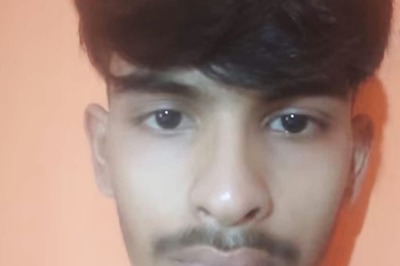
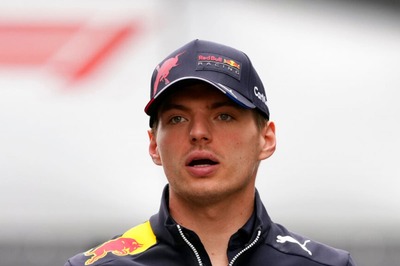
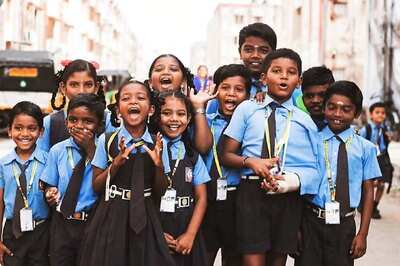
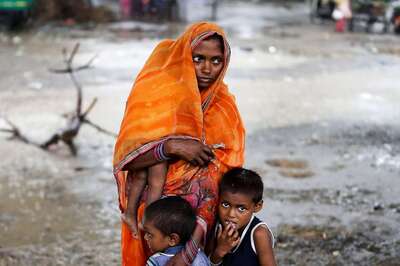
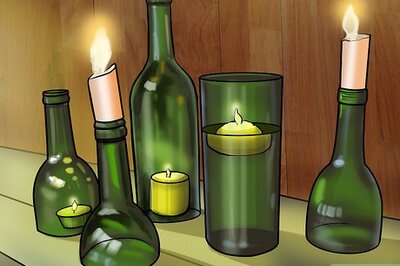



Comments
0 comment